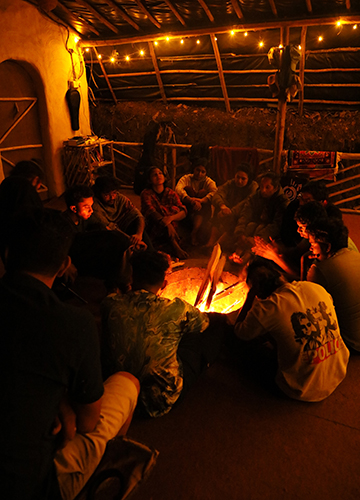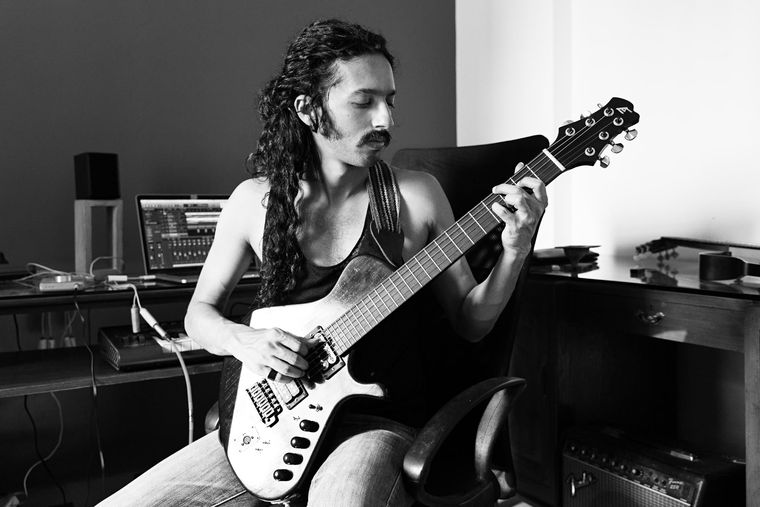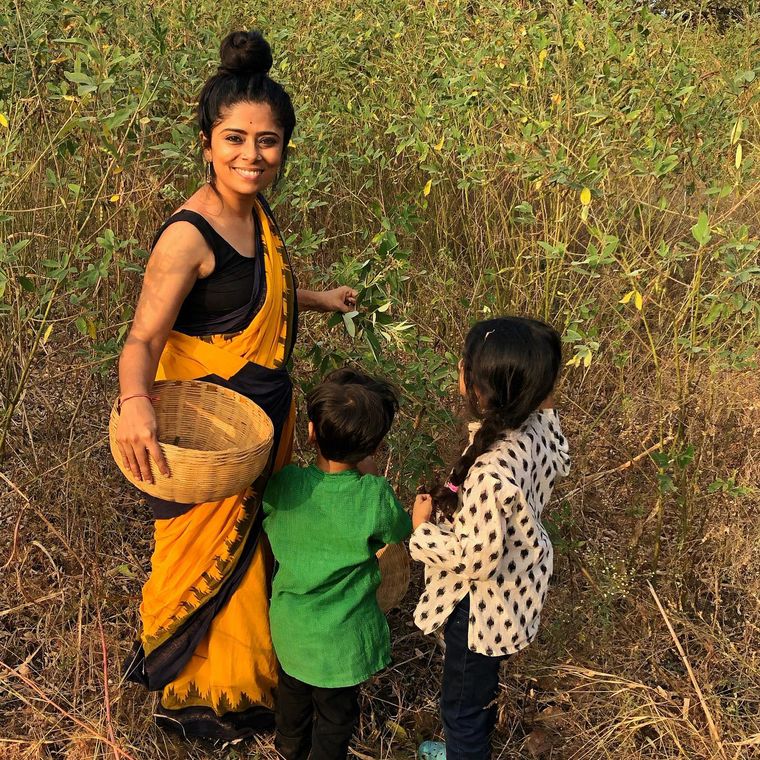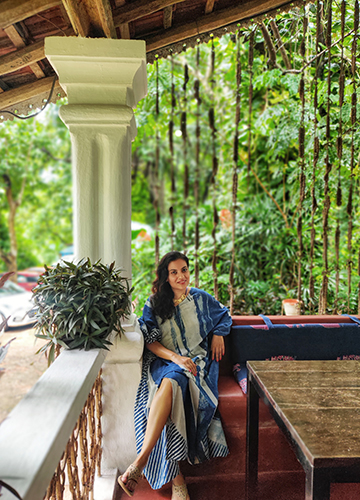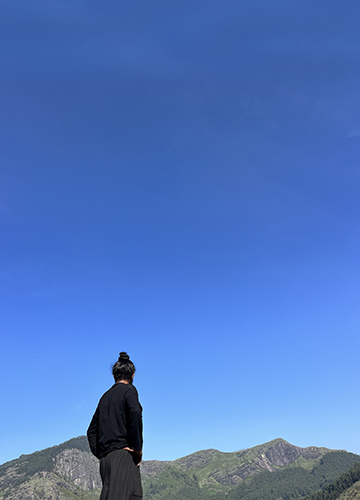In the beginning, our trek to Urvi Earth Centre in Vattavada, Kerala, is poetic, as all treks initially are. As we trudge a mud path that cuts through the forest, we ooh and aah at the waterfalls and the pristine meadows. The sky is rimmed deep copper, as though it is rusting at the edge. Slowly the path grows treacherous and our breathing grows laboured. As dusk gathers, the land assumes a dishevelled look. We realise we are walking deeper into the forest. Overhead, the wheeling birds turn into silhouettes and the darkness grows clamorous with insect calls.
It is with much relief that we welcome the sight of Bodhi, Urvi’s founder. He expresses no surprise at seeing two mud-splattered ragamuffins waiting by the stony track―suitcase in hand, forlorn expressions in place―and wordlessly leads us the rest of the way to the holistic nature and art retreat centre.
In his flowing pants, shepherd’s staff and hair pulled into a tight bun, Bodhi could have been a Biblical prophet sent to save lost souls, which we might very well have been. And we are not the only ones, either. There are others: an engineer from Thiruvananthapuram, a photographer from Wayanad, an artist from Bengaluru, a single mother who works at ISRO…. We are all there to soak in the charm of Urvi and its founder. Languidly clustered around a fire, hugging ourselves as the night grows chilly, we talk about our lives and our aspirations. Over pancakes served on steel plates, each of us tells why we are there. And that is when something strikes us: everyone who comes to Urvi is a seeker. They are not just there for the stunning beauty of the land or for the camping experience. They are there to fill a void within themselves. They are there to find meaning.
“I am attracted more to the person than the place,” says one of them. “There is a stillness about Bodhi that is appealing.”
We know what she means. Bodhi, 25, truly looks as though he might have the answer to what writer Douglas Adams called “Life, the Universe and Everything”. He came alone to Vattavada in December 2021 and lived in a tent for several weeks while he scouted the area and, with the help of a few villagers, built Urvi’s main structure. Nearly two months later, he held a volunteers’ festival to recruit others. Soon, a core team was formed that helped him with the management, design, and marketing of the centre, consisting of Tejaswi Dantuluri, Nivya Dileep, Vipin E.K., Thejus Suresh, Anushree Warrier, Nishad Ali, Rahul Janardhanan and Mitha Rehna.
There were many obstacles. Initially, Bodhi came at the peak of winter without proper warm clothes. He spent two nights shivering with fever, with no one to help. Just before they were to inaugurate the centre in February, there was a forest fire. The whole hill caught fire, and Urvi was hemmed in by it. Luckily, Bodhi, along with a few others, was able to put it out before the centre burnt down. Today, Urvi functions as a sustainable and spiritual community centre that offers camping, art, and meditation workshops.
“I was studying engineering when it struck me how society only functions on the foundation of money,” says Bodhi, who credits his mother for starting him on this spiritual journey. “Don’t misunderstand me, I am not against money. Only against how everything revolves around it. Everything in life is now controlled by the market. It makes you feel insecure, like you are not enough, so that you keep wanting more. So I thought, let us form a community that uses the market rather than be used by it. The objective of Urvi is to transform people emotionally, spiritually, and physically.”
They define the concept of slow living as a counterculture to the fast-paced life. As Dantuluri, who helped set up Urvi, says, “The market has an inherent nature of speed, because it is an industrial model. You want to work more and earn more, and for that you cannot afford to be slow. So, in the process, people lose control over their lives.” It is against this that Bodhi and his team at Urvi offer an antidote: happiness from within and not without. They were the first slow warriors we met.
As early as 1982, Larry Dossey, an American physician, coined the term “time sickness”, or the feeling that “time is getting away, that there is not enough of it, and that you must pedal faster and faster to keep up”. Since then, we have all fallen victim to it. From fast food chains to unbridled consumerism to multitasking to lightning speed internet, we are living in a world that is accelerating at full throttle. In November, it was reported that China had launched the fastest internet in the world, capable of transmitting 1.2 terabits of data per second, which meant that it could download an HD film 150 times in under a second. The global fast food market reached $672 billion in 2022, and is expected to grow at 4.91 per cent per year. McDonalds, the world’s largest fast food chain, announced this month its plan to open 10,000 new stores globally by 2027 in what it says will be its fastest period of growth. It also announced a partnership with Google to automate restaurants using artificial intelligence. In a bid to save time and earn more, overworking and multitasking are the new norm. According to the Global Wage Report 2020-2021, after Gambia, Mongolia, Maldives and Qatar, India has the longest working hours in the world, with an average of 48 hours a week.
The human brain is hardwired for speed, which has evolutionary origins, says Dr Alok Kulkarni, mental wellness expert and senior consultant psychiatrist at Manas Institute of Mental Health, Hubli. “In the evolutionary scheme of things, humans have been primed for movement. We have traditionally been hunter-gatherers. Keeping a constant vigil to fend off attacks from wild animals was an intuitive and protective mechanism. This required the ‘fight or flight’ response. [The brain chemicals] epinephrine and norepinephrine regulate the sympathetic nervous system, which plays a pivotal role in this fight or flight response.”
However, he says that slowing down your life can, in some ways, produce changes in the brain. “In today’s fast-paced world, where we are bombarded by sensory overstimulation, slowing down can be a novel experience,” he says. “Any experience can produce neuroplastic changes.”
Slowing down your life is not a new concept. As Carl Honore writes in his book, In Praise of Slow, some of the greatest people in the world were slow thinkers. Charles Darwin described himself as one. Albert Einstein was famous for spending ages staring into space in his office at Princeton University. In the stories of Arthur Conan Doyle, Sherlock Holmes weighs up the evidence from crime scenes by entering a quasi-meditative state, “with a dreamy vacant expression in his eyes”.

The difference today is that in the age of social media, the slow warriors have become united. They have turned into a community with a structure and a philosophy, an ecosystem and a code of conduct. If earlier, our forefathers put a premium on self-sacrifice, the slow warriors today put one on self-affirmation and self-worth. They are looking inward instead of outward for a sense of peace and contentment. As Honore writes, “That sense that something is missing from our lives underpins the global yearning for slowness.”
In this age of ‘instant’―instant gratification, instant loans, instant noodles―there are many things tying these slow warriors together: a minimalistic lifestyle, the pre-eminence of spirituality and meditation, a focus on sustainability, a determination to live in the present, a search for meaning and the pursuit of their passion.
“Slow living to me means letting go and not being bothered by what others think,” says Abhinav Saxena, 38, an independent musician who plays soulful rock and blues in Mumbai. Making money is not a priority for him. Learning vipassana in an ashram at the age of 20 convinced him that we can live with the bare minimum. “I am happy to live with what I have,” he says. “I like to earn local and buy less. In short, slow living means taking time to smell the roses, eating well, meditating, and taking care of your mental health.”
Today, I put my hand on a patch of moss and tried to listen.
silence at first,
and then
bird call,
crickets,
village roosters crowing in the distance.
the sound of my breath
in and out,
and in and out
and then,
I hear,
you and me, child
we are not so different
Today human, tomorrow moss.
-Writer and regenerative gardener Neha Sumitran, on Instagram
Neha Sumitran, 37, moved to Pethuparai in Tamil Nadu from Mumbai with her husband four-and-a-half years ago. She spends her days gardening, cooking, and writing. In Mumbai, Sumitran worked as a journalist for Nat Geo Traveller, covering food and travel.
“I had a full-time job,” she says. “I was out the door within an hour of waking up, and in my office till 6pm. Then I would come back home, make myself dinner and go to bed. A lot of time went in just commuting from home to work and back.”
After a point, Sumitran could not take this lifestyle anymore. While at Nat Geo Traveller, she got to travel across the country and meet many homestay owners. That is when it struck her that there were other ways to live her life. She grew up in Chennai and Mumbai always wanting to live in the country. At some point, she realised that if she wanted to see whether this lifestyle worked, the best way was to do it, because no amount of research was going to compare.
“Now, my days are more fluid,” she says. “I do not have a full-time job, but I do many things at different points of time. The flexibility allows me to choose what I do and dictate the pace at which I do it. There is a big difference from when I lived in Mumbai. Nowadays, I wake up much earlier at 6am. The first few hours of the day I spend with myself, doing yoga, meditation, and taking my dog for a walk. After breakfast around 9am, I decide whether it is going to be a laptop day or a garden day. On a laptop day, I write, edit, or work on a workshop or module. On a garden day, I plant, trim, or fence my garden.”
Before they settled in Pethuparai, the couple travelled to Goa, UP, and a few other places to get hands-on experience on how to grow a garden. They also did a course in permaculture, and applied everything they learned. They did not think they would settle in Pethuparai, but then they fell in love with the community. “The benefit of slowing down is that you give yourself the time and space to think about things, like who you are in your community, and what you can give back to it. The way you interact with the community, and the way it interacts with you,” says Sumitran.
Slowing down your lifestyle is not easy. You don’t magically change your personality. Your habits remain the same. “Initially, I was scared to slow down, because I was scared to meet myself,” she says. “Who was I going to meet, I wondered. I had to learn how to rest. I had to teach myself with great tenderness how to slow down. Many days are difficult because it is not comfortable. Many days are exquisitely beautiful.”
The couple leads a self-sustaining lifestyle today. They get all their greens from the garden. Ten to 20 types of edible greens grow seasonally. There are a lot of herbs, beans, tomatoes, yams, and sweet potatoes. “Every day, there is something or the other,” she says. “Today, I got some chilli, coriander and green tomatoes and made a green chutney with it. Another day, we might get lemon grass, Thai basil or Kaffir lime to make Thai curry.”
They are able to sustain their needs, but it is difficult to save money for something like building a house, she says. But today, her interests and the way she wants to spend her money are different. “I think less is more,” she says. “Because then you can enjoy what you have. I see how much richness and nourishment there is around me. The perspective on what is luxury has changed. Waking up and feeling the sun on my skin―that is luxury. Spending a few hours by the rock pool near my house―that is luxury. My experiences might have narrowed, but their richness has increased. The definition of wealth has changed. Now I think of it in terms of wellbeing, in terms of the number of strong relationships I have, in terms of time. Everything shifts at such a deep level.”
When Kamana Gautam, 40, lived in Delhi, she was a perfectionist and overly concerned about what others thought of her. Her priority was to make money and buy branded stuff. “I started [thinking of] brands [as a] status symbol,” she says. Gautam, a certified nutritionist, moved to Hyderabad eight years ago. And when she had children, she decided she did not want this lifestyle for them. Slowly, she started moving away from it. “In the end, it is all about materialistic consumption,” she says. “We associate our happiness with what we own, whether clothes or anything else. I wanted to detach myself from the notion that happiness can be purchased.”
She decided to homeschool her two children, nine and seven years old. “When I look back at my own schooling, there was constant competition, all sorts of shaming and reinforcing of stereotypes,” she says. “I did not want that for my kids. I wanted to provide a creative environment where they were free to learn on their own. So I decided to give homeschooling a try, and it has been working great so far. They are currently much ahead in academics than kids their age. In addition, they are learning ukulele, crochet, and sign language. The whole idea is to show them the world, inculcate practical skills and build confidence.”
She makes it a point to take them on trips to build a connect with nature and give an idea of sustainable living. “Sometimes it is easy to get carried away by what people around you are doing. It was too much noise for me, and I decided I needed to take vacations with my kids to make them understand that there is life beyond this as well. We started visiting communities where people led an alternate lifestyle. I might take them to a tribal area and make them understand the privilege of having access to electricity and other facilities. They observe how it is the girls who fetch water every morning and how education is denied to so many kids. I wanted my children to cultivate empathy, and provide them with an environment which is conducive for critical and creative thinking.”
She says this kind of lifestyle is not always easy. “Sometimes I take my children for morning walks and they see kids going in school buses,” she says. “And I tell them that they are free to choose. If they want to go to school, they can.” Her family often criticises her for her decisions. Her mother does not like how she dresses her children in simple cotton clothes, often second-hand.
It is also difficult to find people who align with her thinking. When her husband takes her to parties, she is overwhelmed with the socialising. The conversations don’t resonate with her. She goes to the washroom and tells herself to take a deep breath. Despite the difficulties, she would never give up this lifestyle. It enables her to heal and introspect. She is much calmer now. Slow living, she says, helps her to think about herself. “Life is so rushed that we stop thinking about ourselves,” she says.
The pushback against life on the fast lane is growing. When Infosys co-founder, N.R. Narayana Murthy, called for the youth to increase their work hours to 70 hours per week to enhance productivity, the backlash was swift. “Boosting productivity isn't just about working longer hours,” Indian entrepreneur and film producer Ronnie Screwvala wrote on X. “It's about getting better at what you do – upskilling, having a positive work environment and fair pay for the work done.”
According to Malti Bhojwani, mindfulness teacher, executive coach and author of Mastering Your Life, overworking and multitasking destroy your ability to access intuition and creativity. Slowing down allows your mind to settle. She describes four brain frequencies: beta, when you are busy and multitasking; alpha when your brain slows down and you can focus; theta, just before sleeping or showering, when “your mind is wandering and you are a little lost”; and delta, when you are in deep sleep. You are most creative in theta, and a deep mindfulness practice can help you develop it, she says. “There is a saying that one should slow down to speed up. When you slow down, you actually get more work done. Because then you are better able to trust your decisions, you are logical and creative, and you are moving in a direction aligned with your purpose and values. When the right opportunities come, you have the energy and vitality to take them,” she says.
Neeti Mehra, Mumbai-based slow living coach and sustainability strategist, would agree. “The slow life is not escapist,” she says. “Rather, it is dynamic, self-aware and reflective.” Though she studied to become a bean counter, she always wanted to be a writer. She did finally become the editor of a luxury magazine, and has written for several global publications like Conde Nast Traveller and GQ India. However, she felt the need to dig deeper into what life had to offer. She started to eliminate the non-essentials in life, and set out to study more about our “folk culture, social and community responsibility and the simple life”.
Mehra, 45, quit her work and started BeejLiving in 2017, a curated platform to promote slow living. From boutique properties and inclusive skincare brands to classical Indian weaves and heirloom bridal labels, BeejLiving is your go-to place for all things slow, designed for people who are looking to embrace “an old way of new living”.
You do not need to make huge changes to your life to practise slow living, she says. It could just be small things like eating seasonally, decluttering your closet, or composting your waste. “When I got a little composting stall in my balcony, I realised how much of organic waste my household was generating,” she says. “It made me want to recycle and move to zero-waste. So, it is these small changes that make you feel good about yourself.”
Mehra learned about minimalism from her grandmothers, both of whom came to India after partition. “They lost everything when they moved from Lahore,” she says. “When we opened one grandmother’s cupboard after her death, we found two handbags and six salwar suits. That was all. But she looked after them really well. The suits would be hand-washed, starched, and sparkling clean.”
Their lifestyle, says Mehra and the other slow warriors, is more about balance than about speed. There is nothing mechanical in what they do, they mine meaning from even the simplest things. Perhaps, their philosophy is best encapsulated by the NBA player Nikola Jokic, who is known for his slowness in a game defined by its frenetic pace. While the other players zip around desperate to score points, there is a stillness about Jokic and a deliberation about his movements. Each step he takes is a step he meant to take. There is no wastage, only a canny watchfulness. It is like he can bend time to his will.


